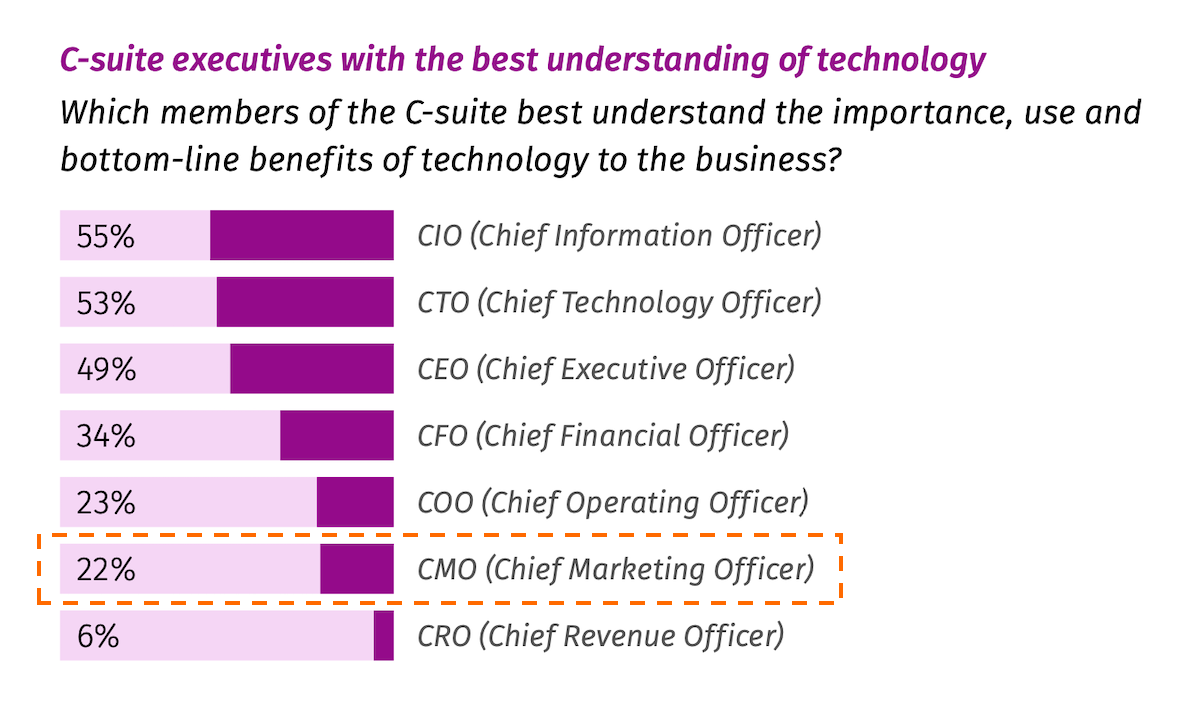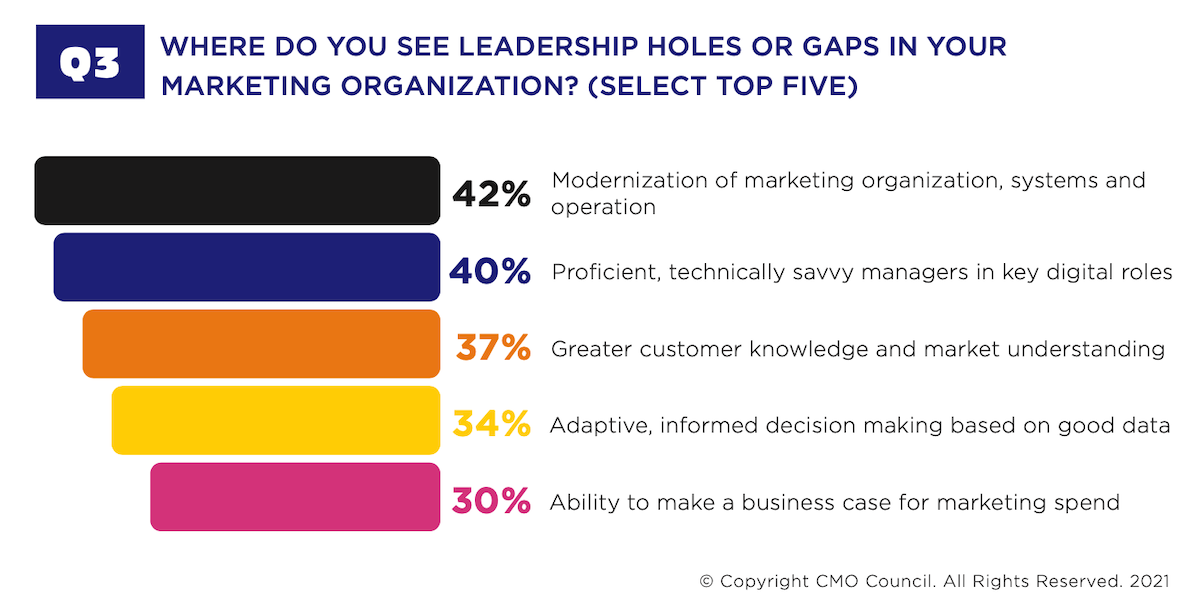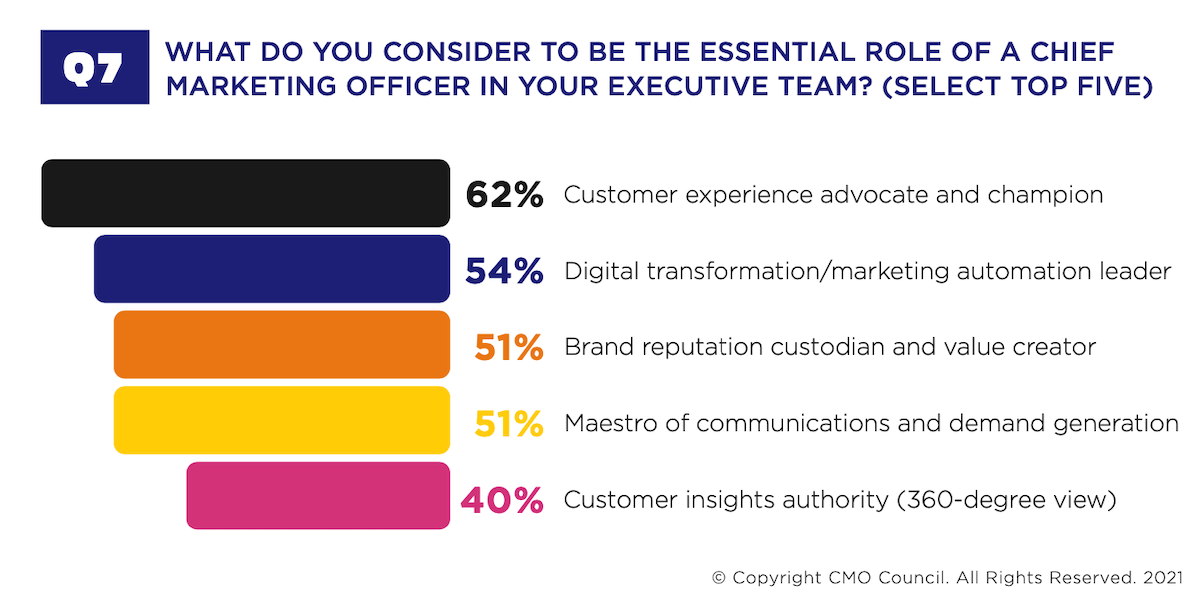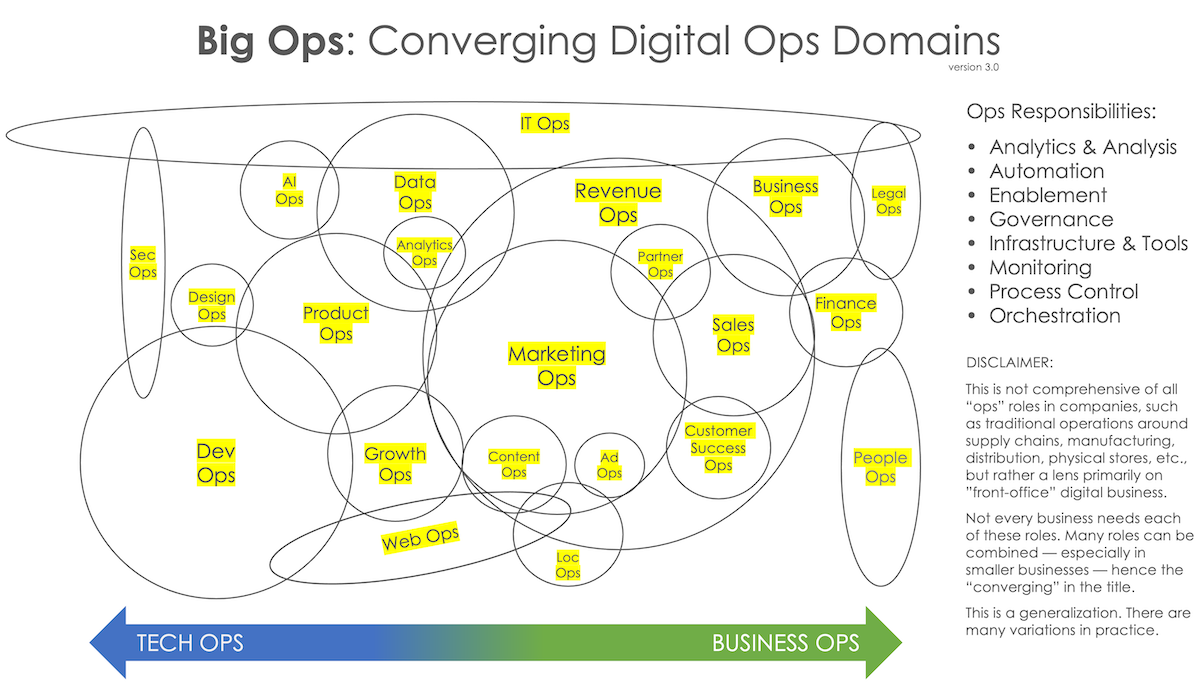A few weeks ago, I read a white paper produced by Rackspace Technology, How Applications Impact Customer Experience. (Spoiler alert: in a digital world, applications are customer experience, so you’d better make them delightful. As a result, CX has become the top priority CIOs and IT. Yay.)
Almost in passing, however, there was the chart above (I added the dotted line highlight).
CMOs were ranked second-to-last as members of the C-suite who best understand the importance, use, and bottom-line benefits of technology to business. Only CROs, who live in the same orbit as CMOs, were ranked lower (at a dismal 6% — yikes).
This threw me for a loop, as I have generally thought of CMOs as being one of the leading champions of technology. It’s a huge portion of their budget. The whole field of marketing technology, if anything, often seemed to uncomfortably push the rest of the organization further into digital, faster than it was ready to accept.
Which led me to wonder, “Who’s doing the ranking here?” In the case of the Rackspace report, their survey targeted 1,420 senior IT decision-makers. Hmmm. Maybe I prematurely declared the 10-years war between marketing and IT was over?
So while this data nagged at me — 1,420 senior IT decision-makers is not a small sample — I set it aside and thought that a more balanced perspective would be a survey of the entire C-suite, including the CEO. What did they think about CMO’s technology leadership? Surely a better opinion, right?
As if to oblige me, the CMO Council recently released Rate the State of Marketing: A C-Suite Scorecard with exactly that data. And it’s not great:
The #1 gap where the C-suite thinks marketing leadership has a hole: modernization of marketing organization, systems, and operation (42%). The next gap, right behind that, was: proficient, technically savvy managers in key digital roles (40%). The next two that follow indict the lack of good customer data (37%) and data-driven decision-making (34%).
Taken together, the C-suite doesn’t see marketing as the vanguard of digital technology, at least not anymore. In a lot of companies, they see marketing now trailing behind.
Now, a related data point in the CMO Council survey were the answers the C-suite gave to the question, “What do you consider to be the essentiual role of a CMO in your executive team?”
The #1 answer: customer experience advocate and champion (62%).
The #2 answer: digital transformation/marketing automation leader (54%).
Truthfully, when I look at this list of the Top 5 roles the C-suite expects from a CMO, I feel like dancing in celebration. This is exactly what marketing leadership should be about in a digital world — and in roughly the same order they’re ranked here.
CUSTOMER EXPERIENCE = MARKETING
…because our brand is what people experience.
DIGITAL TRANSFORMATION = CUSTOMER EXPERIENCE
…because digital operations is how we actually deliver customer experience.
Therefore, by transitive logic:
DIGITAL TRANSFORMATION = CUSTOMER EXPERIENCE = MARKETING
It’s an epic milestone that this is now the equation in the minds of C-suite executives. So here we are, at the finish line of a decades-long marathon to elevate marketing beyond Don Draper to Donna Digital, and we’re tripping on our martech shoelaces?
Of course, to be fair, the inverse of these survey numbers indicate that most CMOs aren’t suffering these gaps. If 42% are perceived as having a gap with modernization, 58% are not. If 40% are perceived as lacking technically savvy digital talent, 60% are not.
You, dear reader, may very well be cruising over the DIGITAL TRANSFORMATION = CUSTOMER EXPERIENCE = MARKETING finish line in top form, shoeslaces tied tight and neat in a bow.
But a word of caution.
The adage of “not seeing the forest for the trees” comes to mind. For all the investment that marketing teams have been making in martech over the past few years, the emphasis is often very specifically on tools for marketing. The cornucopia of products on the 8,000+ marketing technology landscape offer plenty of wonderful examples.
Don’t get me wrong: there are many, many amazing products that supercharge marketers in the myriad of tasks and responsibilities they must cover. You should harness them to your advantage. But the strengths of many of these specialist apps — having been purpose-built and lovingly designed for marketing use cases — is often also their boundaries. They’re for marketers.
They’re great martech. But they’re not the full picture of martech.
The bigger the scope of marketing becomes — and, hey, CUSTOMER EXPERIENCE and DIGITAL TRANSFORMATION are pretty darn big scopes — the more “martech” is about the technologies that empower the entire organization.
It’s some of the technologies that we identified in the virtual stack platform — which isn’t just a martech stack, but really a business-wide tech stack. Data lakes and data meshes. Cross-departmental automation and workflow. Universal business intelligence tools. Privacy and compliance governance tools that oversee all customer-related touchpoints and data stores.
In many cases — even most cases — these tools aren’t owned exclusively by marketing. But it’s crucial for marketing to integrate with them, contribute to them, and leverage them as part of our overall martech fabric. The martech stack is blending into the digital business stack.
And that’s a Really Good Thing.
It’s a bigger mission with opportunity for greater impact: global optimization of digital business capabilities, not just local optimization of marketing-only capabilities.
This is at the heart of the RevOps movement you’ve been hearing about (and may already be participating in — kudos if you are), connecting data, systems, and processes across marketing, sales, and customer service. In turn, RevOps is part of the larger shift from Big Data to Big Ops that is at the very heart of what digital transformation is all about.
There’s still tremendous power and innovation ahead in marketing-only martech.
But there’s greater power and innovation in the forest in which those trees thirve. The CMO must be one of the rangers of that forest, to help nurture it and guide the path for customer experience within it.







